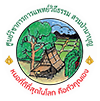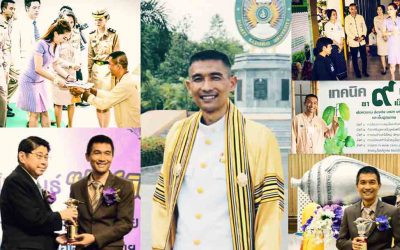วิเคราะห์หลักพุทธธรรมในการบริโภคอาหารของชุมชนแพทย์วิถีธรรม
นางจงกช สุทธิโอสถ
วิทยานิพนธ์นี้เป็นส่วนหนึ่งของการศึกษา
ตามหลักสูตรปริญญาพุทธศาสตรมหาบัณฑิต
สาขาวิชาพระพุทธศาสนา
บัณฑิตวิทยาลัย
มหาวิทยาลัยมหาจุฬาลงกรณราชวิทยาลัย
พุทธศักราช ๒๕๖๖
(ลิขสิทธิ์เป็นของมหาวิทยาลัยมหาจุฬาลงกรณราชวิทยาลัย)
- ชื่อสารนิพนธ์ : วิเคราะห์หลักพุทธธรรมในการบริโภคอาหารของชุมชนแพทย์วิถีธรรม
- ผู้วิจัย : นางจงกช สุทธิโอสถ
- สาขาวิชา : สาขาวิชาพระพุทธศาสนา บัณฑิตวิทยาลัย
- คณะกรรมการควบคุมวิทยานิพนธ์ :
- พระครูปริยัติเจติยานุรักษ์, ผศ. ดร., ป.ธ. ๔, พธ.บ. (พุทธจิตวิทยา), พธ.ม. (พระพุทธศาสนา), พธ.ด. (พระพุทธศาสนา)
- รศ. ดร.เทพประวิณ จันทร์แรง, พธ.บ. (ศาสนา). ศศ.บ. (ไทยคดีศึกษา), M.A. (Buddhist Studies), Ph.D. (Pali and Buddhism)
- วันสำเร็จการศึกษา : ๒ มิถุนายน ๒๕๖๖
บทคัดย่อ
งานวิจัยเรื่องนี้มีวัตถุประสงค์คือ ๑) เพื่อศึกษาการบริโภคอาหารตามหลักพุทธธรรม ๒) เพื่อศึกษาการบริโภคอาหารตามแนวแพทย์วิถีธรรม ๓) เพื่อวิเคราะห์หลักพุทธธรรมในการบริโภคอาหารของชุมชนแพทย์วิถีธรรม เป็นงานวิจัยเชิงคุณภาพ แบบการวิจัยเอกสาร ร่วมกับการสัมภาษณ์เชิงลึกและสังเกตแบบมีส่วนรวม ผลการวิจัยพบว่า
การบริโภคอาหารตามหลักพุทธธรรม ใช้หลักของ “อาหาร ๔” ที่กล่าวไว้ในพระไตรปิฎก โดยมีหัวใจสําคัญ คือ การดับตัณหาในกามคุณ ๕ ของการบริโภคที่ไม่มุ่งเสพของอร่อย ให้เน้นไปที่มีประโยชน์ รับประทานในปริมาณที่พอดี (โภชเนมัตตัญญุตา) ทานอย่างมีสติตามขั้นตอนของหลักอาหาร ๔ คือ กวฬิงการาหาร ผัสสาหาร มโนสัญเจตนาหาร วิญญานอาหารและสามารถปรับเปลี่ยนได้ตามเหตุตามปัจจัย ไม่ยึดมั่นถือมั่นของกฏไตรลักษณ์ด้วยความเข้าใจและยินดี
การบริโภคอาหารตามหลักแพทย์วิถีธรรม สอนให้รู้จักเลือกอาหารไร้สารพิษให้เหมาะกับสภาพของร่างกายและสภาพอากาศ เน้นการบริโภคให้เกิดสมดุลร้อนเย็นตามสภาพธาตุร้อนธาตุเย็นของแต่ละคน โดยรู้วิธีปรุงที่รสไม่จัด เคี้ยวละเอียด ทานอาหารตามลำดับจากสิ่งที่ย่อยง่ายไปสู่การย่อยยากและประกอบด้วยสารอาหารที่ร่างกายต้องใช้ตามหลักโภชนาการของกองอนามัยโลกด้วย
จากการฝึกจิตอาสาให้บริโภคอาหารตามหลัก “อาหาร ๔” ของพระพุทธศาสนาจนสามารถแยก “อาหารที่ให้ผลต่อร่างกาย” และ “อาหารที่ให้ผลต่อจิตใจ” ได้มีการผสมกับวิชาแพทย์ทางเลือกดั้งเดิมในการขับพิษออกจากร่างกายของชาวเอเซียด้วยวิธีของยา ๙ เม็ด ผสมผสานกับหลักเศรษฐกิจพอเพียง ปลูกสิ่งที่กิน กินสิ่งที่ปลูกแบบพึ่งพาตัวเอง ทานพืช จืด สบายให้มีความสมดุลทางกายและใจ ฝึกเป็นคนเลี้ยงง่าย กินง่ายอยู่ง่าย หาอาหารที่ขึ้นเองตามธรรมชาติแบบคนวรรณะ ๙ ไม่บริโภคเนื้อสัตว์ เมื่อเลี้ยงตัวเองได้ ก็มีการเสียสละ แบ่งปันไปสู่มวลมนุษยชาติต่อไป
ผลการวิเคราะห์ทำให้ผู้วิจัยได้ค้นพบ ความสอดคล้องระหว่างการบริโภคอาหารตามหลักพุทธธรรมกับแนวแพทย์วิถีธรรมว่า การใช้ชีวิตด้วยปัจจัย ๔ โดยใช้ “อาหาร ๔” มาประกอบกันกับ หลักอปัณณกปฏิปทา ๓ (สำรวมอินทรีย์ ทานแต่พอดี ทานอย่างมีสติ) ลักขณสูตร ภูตะสูตร อาหาเรปฏิกูลสัญญา และสังคีติสูตร เข้ามาประยุกต์ในการบริโภค ใช้ปาณาติปาติสูตร (ทานมังสะวิรัติ) เคี้ยวอาหารให้ละเอียด จากการปฏิบัติอย่างสม่ำเสมอมาได้ ๗ ปีเป็นอย่างน้อย จะมีผลทำให้ร่างกายแข็งแรง อายุยืน, มีความผาสุก
An Analysis of Buddhadhamma Concerning Food Consumption as Found in the Dhamma Medicine Community
Mrs. Jongkot Suttiosot
- Researcher : Mrs. Jongkot Suttiosot
- Degree : Master of Arts (Buddhist Studies)
- Thesis Supervisory Committee :
- Phrakrupariyathijethiyanuruksa, Asst. Prof. Dr., Pali IV, B.A. (Buddhist Psychology), M.A. (Buddhist Studies), Ph.D. (Buddhist Studies)
- Assoc. Prof. Dr. Thepprawin Chanraeng, B.A. (Religions), B.A. (Thai Studies), M.A. (Buddhist Studies), Ph.D. (Pali and Buddhism)
- Thematic Paper Title : An Analysis of Buddhadhamma Concerning Food Consumption as Found in the Dhamma Medicine Community
- Date of Graduation : June 2, 2023
ABSTRACT
The aims of this investigation encompassed: 1) exploring food consumption aligned with Buddhist Principles, 2) scrutinizing the connection between food consumption and the Buddhist Dhamma Medicine theory, and 3) delineating the application of Buddhist principles in the food consumption patterns of the Dhamma Medicine Community. A combined approach of documentary and qualitative research was deployed, supplemented by comprehensive interviews and participant observation.
Food consumption according to the Buddhist Principles follows four steps of Buddhist Recipe Courses : Food, Sense contact, Intention and Mind that can be adjusted with pleasure for physical condition without attachment to it.
The findings suggest that food consumption, as guided by Buddhist principles, adheres to a four-step process delineated in Buddhist Recipe Courses: Food, Sense contact, Intention and Mind. These stages can be modified to suit individual physical conditions, whilst preventing attachment.
An examination of food consumption in line with the Dhamma Medicine approach reveals a meticulous process. The initial step involves selecting non-toxic ingredients suitable for individual health and adjusting to prevqiling climatic conditions. The focus is on achieving a balanced interplay of hot and cold elements within everyone. The process also entails moderate seasoning, thoroygh mastication, and sequential consumption based on ease of digesrion. The diet contains essential nutrients required for human health in line with the dietary guidelines prescribed by the World Health Division.
An anlysis of food consumption within the Dhamma Medicine Community involved educating community members and patients on distinguishing between “Food for physical body” and “Food for Spirituality,” utilizing the nine theoretical pills of Buddhist Dhamma Medicine. Participants were encouraged towards self-sufficiency – easy to care for, easy to eat, easy to live. The food sourced was preferably organically or naturally grown, embodying the nine virtues of Asian individuals. A vegetarian diet was promoted, devoid of meat, and combined with scientific understanding of the hot and cold characteristics of different food items. Thisapproach was amalgamated with traditional alternative medicine to detoxify Asian bodies via nine methods. The philosophy of sufficiency economy was followed, emphasizing locally sourced food’s benefits, fostering community cohesion, and supporting a simply lifestyle. Upon reaching self-sufficiency, individuals were encouraged to continue sharing with the broader human community.
The research results highlight a clear alignment between food consumption according to Buddhist principles and the practices of the Buddhist Dhamma Medicine Community. This alignment incorporates living by the four factors derived from Buddha’s principles and following the four steps of the Buddhist Recipe Courses in food consumption. By integrating mindful eating, vegetarianism, thorough mastication, and other Sutra in Tripitaka, and maintaining this practice over at least seven years, Individuals are predicted to achieve robust health, longevity, and overall well-being.
วิธีใช้ Embed PDF
- กรุณากดลูกศร ซ้าย-ขวา ในการเปลี่ยนหน้า
- ถ้าหากตัวอักษรเล็ก-ใหญ่เกินไป กรุณากดเครื่องหมาย บวก-ลบ เพื่อปรับขยาย-ลดตัวอักษร
ประวัติผู้วิจัย
| ชื่อ –สกุล | นางจงกช สุทธิโอสถ |
| วัน เดือน ปี เกิด | ๑๖ เมษายน ๒๔๙๑ |
| ที่อยู่ปัจจุบัน | ชุมชนภูผาฟ้าน้ำ มูลนิธิแพทย์วิถีธรรมแห่งประเทศไทย ๓๑/๓๑ หมู่ ๕ บ้านแม่เลา ตำบลป่าแป๋ อำเภอแม่แตง จังหวัดเชียงใหม่ ๕๐๑๕๐ |
| ประสบการณ์การทำงาน | • ผู้จัดการร้านอาหาร “ทุ่งคากาแฟ” (๒๕๑๖- ๒๕๒๐) • ผู้จัดการ บริษัท ภูเก็ตแทรเวิลแอนด์ทัวร์ (๒๕๑๔-๒๕๒๐) • ห้างหุ้นส่วนจำกัด ซี.ซี.อี. (๒๕๒๓-๒๕๕๒) |
| ตำแหน่งทางการเมือง | กรรมการการเมืองภาคพลเมืองของสถาบันพระปกเกล้า จังหวัดภูเก็ต (ปัจจุบันลาออกแล้ว) |
| ประวัติการศึกษา | วิทยาศาสตรบัณฑิต (อาหาร โภชนาการและการประยุกต์)มหาวิทยาลัยสุโขทัยธรรมาธิราช (๑ สิงหาคม ๒๕๕๙) ศิลปศาสตรบัณฑิต สาขาวิชาผู้ประกอบการสังคม สถาบันอาศรมศิลป์ (๓ สิงหาคม ๒๕๖๑) |
| ปีที่เข้าศึกษา | ๒๕๖๔ |
| ปีที่สำเร็จการศึกษา | ๒๕๖๕ |


